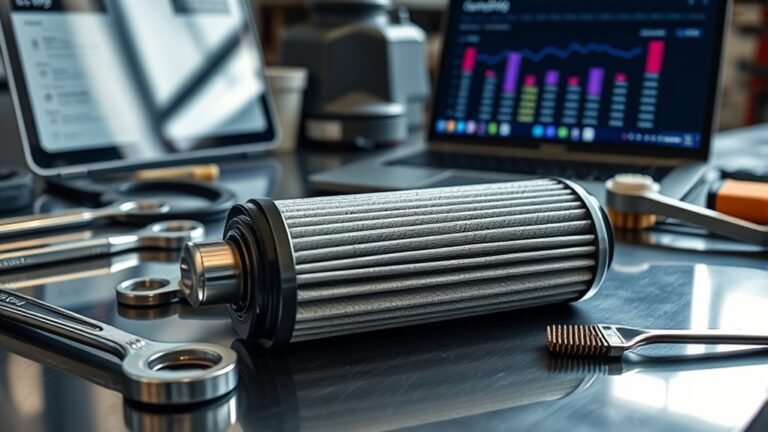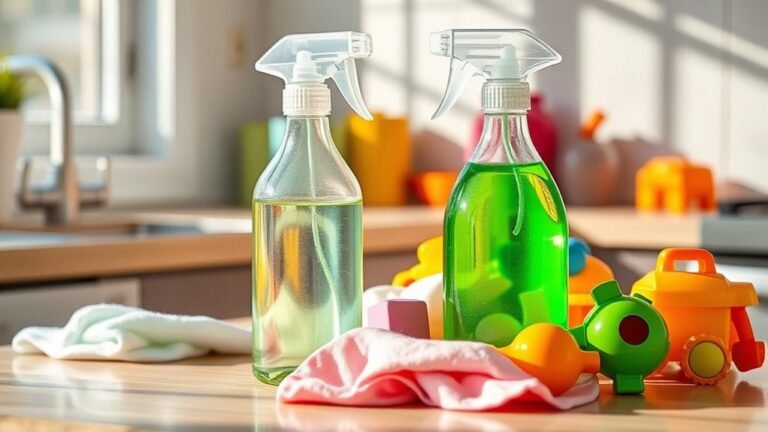How to Make Homemade Car Cleaner
You can easily make an eco-friendly car cleaner using one cup of white vinegar, two tablespoons of baking soda, and warm water. Simply mix vinegar and baking soda slowly in a spray bottle, add water, then shake gently. Use a soft cloth or sponge to clean surfaces without scratching, and avoid soaking fabrics or electronics. This homemade cleaner saves money while being safe for your car and the environment. Keep exploring to discover tips on application, storage, and safety.
Essential Ingredients for Homemade Car Cleaner
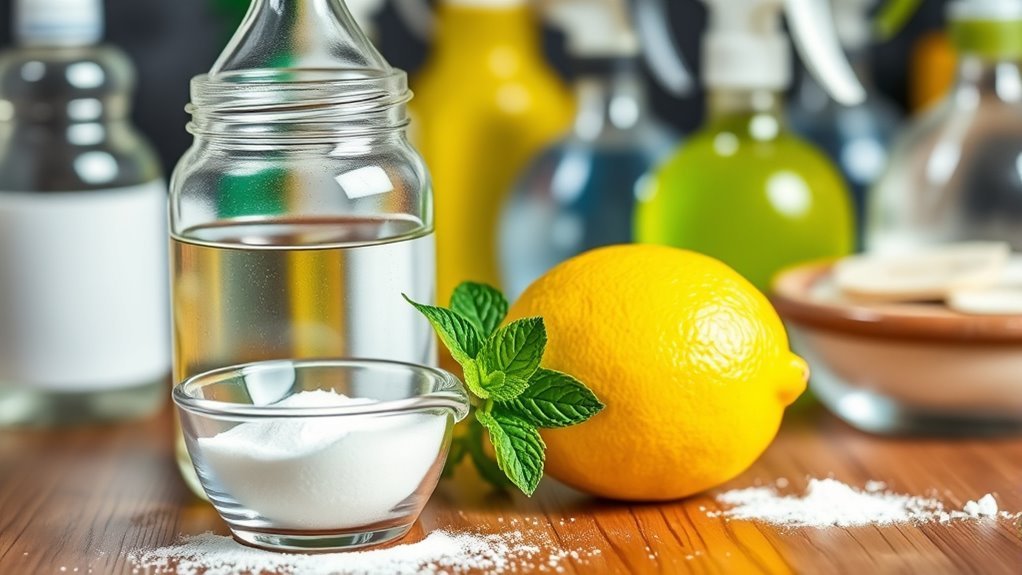
To make an effective homemade car cleaner, you’ll need just a few essential ingredients that are easy to find. First, a vinegar solution is key—it cuts through grime and leaves your car smelling fresh without harsh chemicals. Next, baking soda works wonders as a natural abrasive, perfect for scrubbing away stubborn dirt and stains without damaging surfaces. These two ingredients give you the freedom to clean your car thoroughly while avoiding commercial cleaners loaded with toxins. With vinegar solution and baking soda in your toolkit, you can tackle everything from windows to upholstery, embracing a cleaner car and a cleaner conscience. This simple combo lets you maintain your vehicle effortlessly, saving money and gaining independence from store-bought products.
Step-by-Step Guide to Mixing Your Cleaner
Start by gathering one cup of white vinegar and two tablespoons of baking soda for your homemade car cleaner. These mixing ratios create a powerful yet safe solution that’ll tackle dirt without harsh chemicals. Next, grab your cleaning tools—like a spray bottle, funnel, and measuring spoons—to make the process smooth and mess-free. Here’s how you mix your cleaner step-by-step:
- Use the funnel to pour the white vinegar into the spray bottle.
- Add the baking soda slowly to avoid overflow.
- Fill the rest of the bottle with warm water and shake gently to combine.
Tips for Cleaning Different Car Surfaces
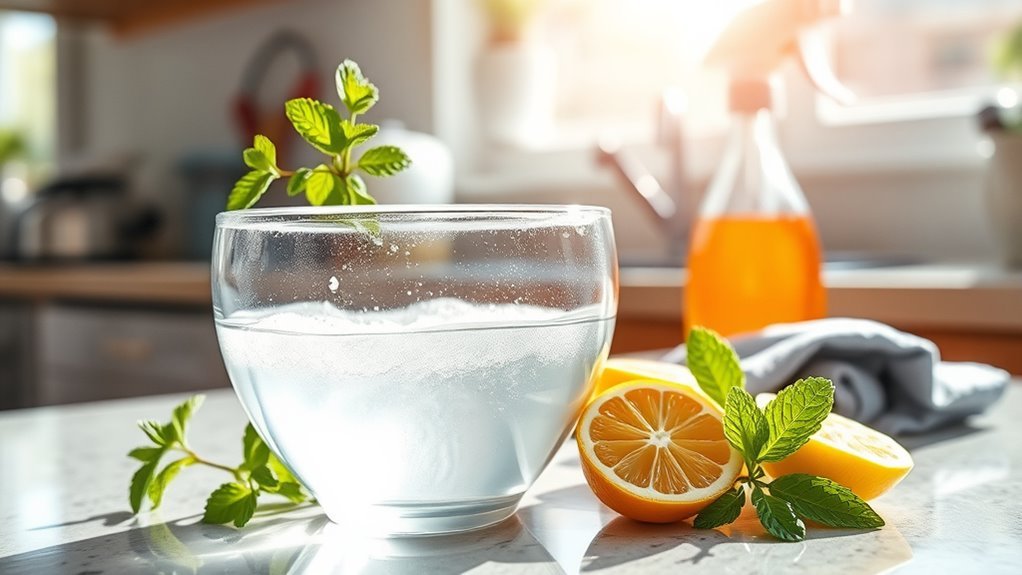
Once you’ve mixed your homemade cleaner, knowing how to apply it to different car surfaces will make a big difference in your results. For exterior cleaning, use a soft cloth or sponge to gently remove dirt without scratching the paint. Rinse thoroughly to avoid residue. When tackling interior cleaning, spray your cleaner on a microfiber cloth rather than directly on surfaces like seats or dashboards to prevent damage. Focus on high-touch areas and use a soft brush for stubborn grime. Avoid soaking fabric or electronics, keeping your approach light and controlled. By adapting your technique to each surface, you’ll maintain your car’s look and feel, all while enjoying the freedom of using your own, effective cleaner.
Eco-Friendly Benefits of DIY Car Cleaning
Although commercial car cleaners might seem convenient, making your own cleaner can greatly reduce your environmental impact. When you create your own formula, you control what goes into it, avoiding harsh chemicals that harm ecosystems. Plus, you save money—homemade solutions cost less than store-bought options. Here’s why DIY car cleaning is a win-win for you and the planet:
Making your own car cleaner cuts costs and chemicals, protecting both your wallet and the environment.
- Lower Environmental Impact: You reduce pollution by using biodegradable ingredients.
- Cost Savings: You spend less on expensive commercial products.
- Freedom of Choice: You customize your cleaner to fit your values and needs.
Storage and Safety Recommendations for Your Cleaner
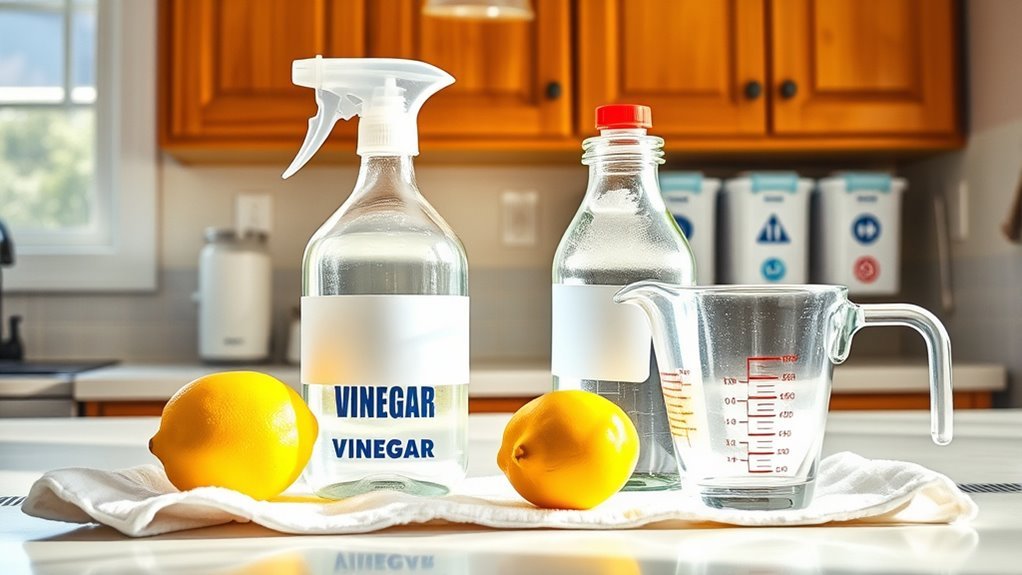
Making your own car cleaner means you know exactly what’s inside, but it also means you need to handle and store it properly to keep yourself and your surroundings safe. Choose airtight storage containers labeled clearly to avoid confusion or accidental spills. Glass or sturdy plastic bottles work best—they prevent leaks and maintain your cleaner’s effectiveness. Keep your cleaner out of reach of children and pets, and store it in a cool, dry place away from direct sunlight. Always follow safety precautions like wearing gloves when handling the cleaner and avoiding mixing it with other chemicals. By respecting these simple storage and safety tips, you maintain your freedom to clean your car naturally, without risking harm or hassle.
Frequently Asked Questions
Can Homemade Car Cleaner Remove Tough Stains Like Tar or Grease?
You might wonder if homemade car cleaner can tackle tough stains like tar or grease. With the right ingredients, your cleaner can be surprisingly effective at tar removal and grease cutting. You’ll enjoy the freedom of using natural, cost-effective solutions that work well without harsh chemicals. Just remember, stubborn stains may need extra attention or repeated applications, but your DIY cleaner definitely gives you a powerful and eco-friendly way to keep your car shining.
How Often Should I Wash My Car Using Homemade Cleaner?
When it comes to frequency recommendations, you don’t have to stick to a strict cleaning schedule unless you want to. Generally, washing your car every two weeks works well to keep it looking fresh without overdoing it. But feel free to adjust based on your lifestyle and driving conditions. If you’re hitting rough roads or bad weather often, you might want to clean it more frequently. Enjoy the freedom to choose what works best for you!
Will Homemade Cleaner Damage Car Paint or Finish Over Time?
Oh, sure, because your car’s paint will *definitely* thank you for some random kitchen concoction! In reality, if you’re careful with your cleaning ingredients, you’re unlikely to harm your paint protection. Just avoid harsh chemicals or acidic substances that can strip finishes. Using gentle, natural ingredients lets you keep your ride shining without locking yourself into expensive products. Freedom means choosing what works, but always think twice before risking your car’s look!
Can I Use Homemade Cleaner on Car Windows and Mirrors Safely?
You can definitely use homemade cleaner for window cleaning and mirror polishing without worry. Just make sure your recipe is gentle and free from harsh chemicals that might leave streaks or damage surfaces. Using natural ingredients gives you freedom to tweak formulas and avoid harmful residues. With the right mix, your car’s windows and mirrors will shine clear and spotless, giving you that fresh, polished look every time you hit the road.
How Does Homemade Cleaner Compare to Commercial Products in Cost?
You’ll find homemade cleaners offer great cost effectiveness compared to commercial products. When you make your own, you’re not paying for branding or extra chemicals, just simple, affordable ingredients. This DIY advantage lets you control what goes into your cleaner and saves you money in the long run. Plus, you’re free from relying on store-bought options, giving you the freedom to customize your car care routine however you want.

